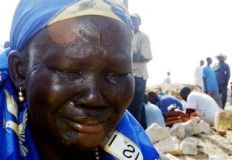South Sudan Security tight for Garang funeral
JUBA, Sudan, Aug 6 (AFP) — Thousands of Sudanese government troops and ex-rebel fighters deployed here Saturday ahead of the funeral of Sudan’s vice president and former southern guerrilla leader John Garang.

|
|
Mary Ayor Mayor cries after seeing the burial site for former rebel leader John Garang, in Juba, southern Sudan Friday, Aug. 5, 2005. (AP) . |
As residents of Juba prepared a massive send-off for Garang, two planeloads of Sudanese soldiers, including members of the elite presidential guard, landed at Juba airport on Friday and were immediately deployed around town.
Heavily armed troops with rocket-propelled grenade launchers and assault rifles were positioned at 10-meter (10-yard) intervals on the streets of Juba which was rocked by deadly violence after Garang’s death, an AFP correspondent said.
Those soldiers joined fighters from Garang’s ex-rebel Sudan People’s Liberation Movement/Army (SPLM/A) who entered Juba for the first time on Wednesday to help quell the violence and provide security for the funeral.
Half a million people, including Sudanese President Omar el-Beshir, South African President Thabo Mbeki, Kenyan President Mwai Kibaki and Ugandan President Yoweri Museveni are expected to attend the service.
Officials from the African Union and the United Nations were also expected.
Garang was killed on July 30 when Museveni’s presidential helicopter on which he was returning to southern Sudan from Uganda crashed in what Sudanese, Ugandan and SPLM/A officials had repeatedly said was an accident due to poor weather.
But on Friday, Museveni said it may not have been an accident, becoming the first official of any government to publicly suggest the crash may have been the result of foul play.
“Some people say accident, it may be an accident, it may be something else,” Museveni told thousands of mourners in the southern Sudanese town of Yei where Garang’s coffin had been brought in an airborne funeral procession to Juba.
“The (helicopter) was very well equipped, this was my (helicopter) the one I am flying all the time, I am not ruling anything out,” he said, adding that an unspecified “external factor” could have been responsible.
Salva Kiir, Garang’s successor as SPLM/A chief declined to comment on the specifics of Museveni’s remarks but said no cause had been ruled out pending an international investigation of the crash.
But in Khartoum and Juba, senior SPLM/A officials cautioned against making any assumptions about the cause of the crash as did a diplomat in Bor, Garang’s birthplace where his coffin was brought after Yei.
Sudanese Foreign Minister Mustafa Osman Ismail meanwhile called on Uganda to cooperate with the investigation into the crash.
“(Garang’s) visit was to Uganda and the aircraft and its crew were Ugandan,” Ismail told the official SUNA news agency.
However he expressed displeasure that the Ugandan authorities only informed Sudan about the disappearance of Garang’s helicopter several hours after they found out.
Sudanese Information Minister Abdul Basit Sebdarat went further still, calling Museveni’s comments “extremely worrying”.
“Uttering statements or speculations ahead of the investigation would harm the probe and the chances of finding the facts, the official SUNA news agency quoted Sebdarat as saying.
Garang and 13 others died when Museveni’s presidential Mi-172 helicopter went down in the mountains of southern Sudan, sparking violence between northerners and southerners in Khartoum and the south that saw 130 killed and hundreds wounded.
His death and the rioting have raised fears of the unraveling of the landmark January peace deal he signed with Khartoum that ended Sudan’s 21-year civil war between the Muslim north and the mainly Christian and animist south.
Relative calm returned to the streets of Khartoum as Muslim leaders appealed for peace and shop-owners reopened for business amid a noticeably lower security presence that was not at all apparent in Juba.
As the Sudanese soldiers and SPLM/A fighters spread throughout the town, thousands of volunteers descended on a former military training ground to help prepare Garang’s burial site.
Weeping women, stoic men and curious children converged on the site near the state parliament where furious construction was underway on a brick and mortar mausoleum to house Garang’s remains.
In accordance with Dinka tribal tradition, one of Garang’s sons, Chol, a 25-year-old fine arts student in Britain, dug up the first chunk of earth where his father will be laid to rest.
“It is a shock. It seems like a dream,” he told reporters here of his father’s sudden death, news of which sparked several days of deadly clashes between northern and southern Sudanese in Juba, the southern town of Malakal and Khartoum.
“Sometimes I wake up and find people weeping,” Chol said. “I never thought I would ever be digging my father’s grave.”
